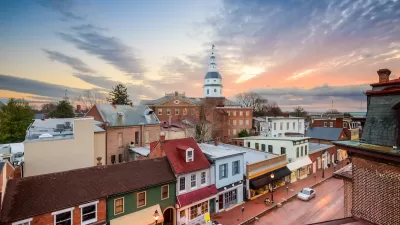This week, Philadelphia officially enacted the long-overdue replacement to its antiquated 1962 zoning code. City leaders hope the simplified and modernized code will encourage development.
According to Inga Saffron, Philadelphia's new streamlined zoning code better reflects the needs of a post-industrial city. "The 384-page manual replaced now-antiquated and cumbersome zoning regulations that had been in use since 1962, when Philadelphia still saw itself primarily as a manufacturing center. The new rules, worked out by a citizens' commission, are meant to support Philadelphia as it rebuilds its residential neighborhoods and evolves into a city of universities, medical centers, and high-rises."
One of the goals that drove the overhaul was to reduce development review and increase predictability for developers. As Saffron notes, "Because the old code was obsolete, nearly every project required a variance from the Zoning Board of Adjustment, a process that was both costly and time-consuming"
Another key element of the code is the formalization of neighborhood involvement in the approvals process. Writing in Next American City, Ryan Briggs notes that, "The new code explicitly states that a public neighborhood meeting must be held for projects requiring a variance and all projects beyond a certain scale, but that representative groups must be Registered Community Organizations (RCOs) that are already on file with the ZBA."
Although Briggs sees the rules dictating community involvement as an improvement over the previous system, he cautions that, "the new regulations don't set a very high bar for registrants and allow for significant overlapping."
Thanks to Stuart Andreason
FULL STORY: Changing Skyline: Philly switches to new zoning code

Planetizen Federal Action Tracker
A weekly monitor of how Trump’s orders and actions are impacting planners and planning in America.

Map: Where Senate Republicans Want to Sell Your Public Lands
For public land advocates, the Senate Republicans’ proposal to sell millions of acres of public land in the West is “the biggest fight of their careers.”

Restaurant Patios Were a Pandemic Win — Why Were They so Hard to Keep?
Social distancing requirements and changes in travel patterns prompted cities to pilot new uses for street and sidewalk space. Then it got complicated.

Platform Pilsner: Vancouver Transit Agency Releases... a Beer?
TransLink will receive a portion of every sale of the four-pack.

Toronto Weighs Cheaper Transit, Parking Hikes for Major Events
Special event rates would take effect during large festivals, sports games and concerts to ‘discourage driving, manage congestion and free up space for transit.”

Berlin to Consider Car-Free Zone Larger Than Manhattan
The area bound by the 22-mile Ringbahn would still allow 12 uses of a private automobile per year per person, and several other exemptions.
Urban Design for Planners 1: Software Tools
This six-course series explores essential urban design concepts using open source software and equips planners with the tools they need to participate fully in the urban design process.
Planning for Universal Design
Learn the tools for implementing Universal Design in planning regulations.
Heyer Gruel & Associates PA
JM Goldson LLC
Custer County Colorado
City of Camden Redevelopment Agency
City of Astoria
Transportation Research & Education Center (TREC) at Portland State University
Camden Redevelopment Agency
City of Claremont
Municipality of Princeton (NJ)





























